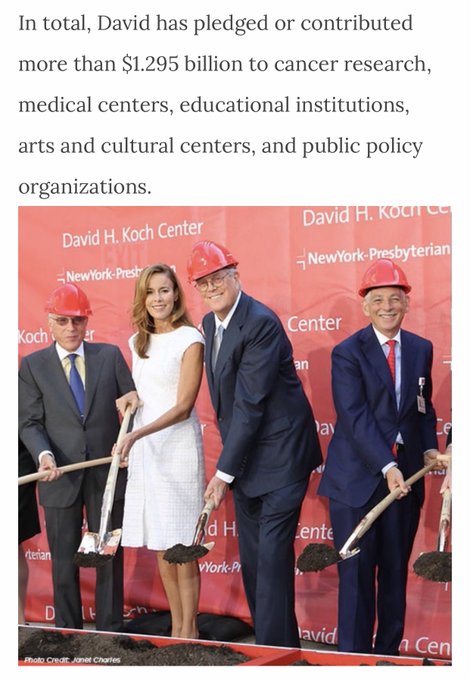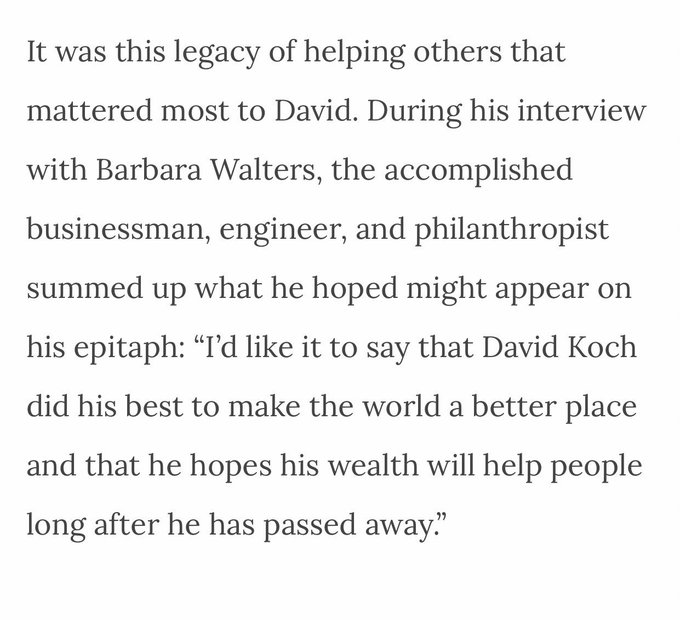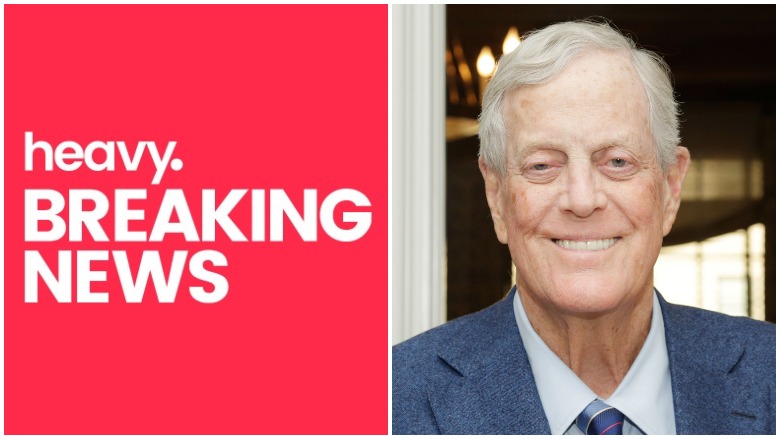
Getty David Koch Cause of Death
David Koch, a conservative, billionaire, philanthropist and political activist, died August 23 at age 79 following a decades-long battle with prostate cancer.
A statement from his older brother, Charles Koch, did not specifically state his cause of death but referenced his long-term battle with prostate cancer.
“Twenty-seven years ago, David was diagnosed with advanced prostate cancer and given a grim prognosis of a few years to live,” the elder Koch and CEO of Koch Industries said in a statement. “David liked to say that a combination of brilliant doctors, state-of-the-art medications and his own stubbornness kept the cancer at bay. We can all be grateful that it did, because he was able to touch so many more lives as a result.”
Koch was a philanthropist who donated nearly $1.3 billion to various causes, according to Koch Industries. These included many New York City cultural, medical, and educational institutions. Many of those bear his name. Koch also donated to cancer research following his diagnosis in 1992. He had an estimated net worth of $51 billion.
Here’s what you need to know:
1. Koch Battled Prostate Cancer for 27 Years
Koch was first diagnosed with prostate cancer in 1992, the year after he survived a plane crash which killed 33 people. He was the lone survivor in first class to survive when his plane, US Airways 737, collided with a commuter plane on the runway at Los Angeles International Airport.
Koch initially struggled with the diagnosis.
“I had a terrible panic attack,” he told the Washington Examiner. “I thought I was going to die.”
Throughout his 27-year battle with cancer, he would endure many treatments which would extend his life but never fully cure him of cancer.
2. Charles Koch Said Doctors Gave His Brother a ‘Grim Prognosis’ & ‘A Few Years to Live’ in 1992
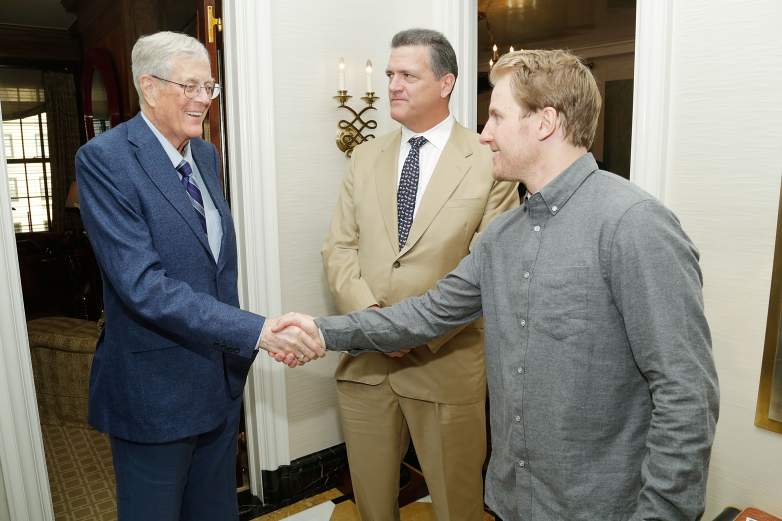
GettyNEW YORK, NY – MAY 17: (L-R) Philanthropist David H. Koch, Former American Track and Field Olympian Augie Wolf and American Alpine Ski Olympic Gold Medalist Ted Ligety attend the U.S. Olympic And Paralympic Foundation Event Hosted By Ellen and Daniel Crown on May 17, 2017 in New York City. (Photo by Lars Niki/Getty Images for United States Olympic Committee)
Following David Koch’s cancer diagnosis in 1992, he received the most advanced medical treatments, including radiation at Sloan-Kettering, surgeries and hormone therapy. The disease would repeatedly return.
“Once you get that disease, and I’ve had it for 20 years almost, you become a crusader to try to cure the disease not only for yourself but for other people,” Koch told the Washington Examiner in 2011.
Those treatments never fully cured his cancer, and Koch turned his sites toward funding research for future treatment opportunities for others.
Charles Koch’s statement announcing his brother’s death said David Koch was given just a few years to live when he was diagnosed with cancer in 1992.
“When cancer started a fight with David Koch in 1991, the disease had no idea who it was up against,” a Koch Industries press release said in 2015. “Two decades after his initial diagnosis, the former executive vice president of Koch Industries has donated more than $200 million to help combat the epidemic.”
3. Koch Made Donations to Fund Medical Research into Prostate Cancer
Koch made generous contributions throughout his life, donating a total of $1.295 billion to various organizations, according to an article by Koch Industries. His contributions included funding toward cancer research, medical centers, educational institutions, arts and cultural centers, and public policy organizations.
Many of his largest donations were toward medical facilities and treatment centers. His legacy lives on through many of those which bear his name. He donated more than $200 million toward medical centers and cancer research by 2015, according to a Koch Industries press release.
More than half of those donations went toward his alma mater, Massachusetts Institute of Technology. The institute opened the David H. Koch Institute for Integrative Cancer Research in 2011. Koch said at the opening he hoped millions of lives would be saved.
Koch also donated funds toward the Memorial Sloan Kettering Cancer Center, NewYork-Presbyterian Hospital, and MD Anderson Cancer Center in Houston. Other major recipients included Johns Hopkins, Stanford University Hospital, the Mount Sinai Medical Center, and the Hospital for Special Surgery.
He was also a member of the Prostate Cancer Foundation.
“Today, we mourn the loss of former PCF board member David H. Koch,” the foundation wrote in a tweet. “Our hearts go out to his family as we remember and honor the immense philanthropic contributions he made towards pushing forward cancer research.”
4. Koch Said Advanced Medications, Doctors & His Own Stubbornness Kept Him Alive
Koch survived far longer than doctors believed he would when he was diagnosed with prostate cancer in 1992. At that time, he was given only a few short years to live. He underwent a series of treatments, surgery, and therapies to heal him of cancer. He was never fully cancer free, but continued fighting.
Koch attributed his long-life following the diagnosis to “a combination of brilliant doctors, state-of-the-art medications and his own stubbornness,” his brother, Charles Koch, said in a statement.
“Anyone who worked with David surely experienced his giant personality and passion for life,” Koch said. “Twenty-seven years ago, David was diagnosed with advanced prostate cancer and given a grim prognosis of a few years to live. David liked to say that a combination of brilliant doctors, state-of-the-art medications and his own stubbornness kept the cancer at bay. We can all be grateful that it did, because he was able to touch so many more lives as a result.”
5. Koch Died Peacefully At Home, Surrounded by Family
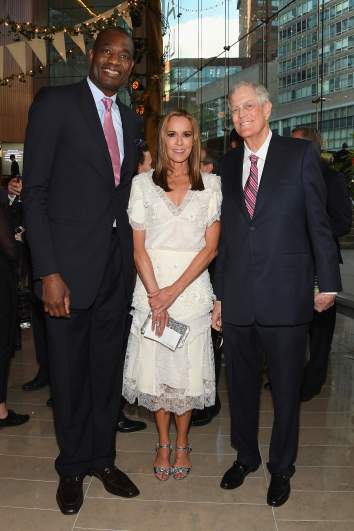
GettyNEW YORK, NY – MAY 02: Dikembe Mutombo, Julie Koch, and David H. Koch attend the Lincoln Center Spring Gala at Alice Tully Hall on May 2, 2017 in New York City. (Photo by Dia Dipasupil/Getty Images for Lincoln Center)
Koch died peacefully at his home, surrounded by his wife and children, his family said in a statement.
“While we mourn the loss of our hero, we remember his iconic laughter, insatiable curiosity, and gentle heart,” the statement said. “His stories of childhood adventures enlivened our family dinners; his endless knowledge rendered him our ‘walking Google.’ His sensitive heart had him shed a tear at the beauty of his daughter’s ballet, and beam with pride when his son beat him at chess. We will miss the fifth link in our family.”
Koch was survived by his wife, Julia Flesher Koch, and three children, David Jr., Mary Julia, and John Mark, and other family members.
Correction: Earlier versions of this story incorrectly said Koch had pancreatic cancer. He had prostate cancer.



